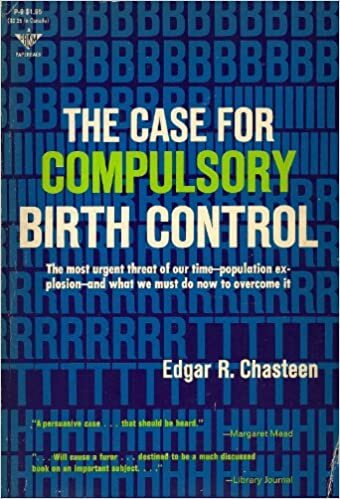Population Control and the Moral Order of the Created Order
In a previous post I worked through some of the worldview of Edgar Chasteen, a one-time Southern Baptist professor of Sociology who advocated for compulsory birth control. Along the way he put some spectacularly anti-human ideas on display, including advocacy of abortion, regret over medical advances reaching the developing world. He also advocated for an individualistic morality including a sexual ethic redefined around the therapeutic. In short, he got a lot of stuff wrong.
However, in his book, The Case for Compulsory Birth Control, there is a paragraph of that shows he recognizes there may be light behind the clouds. It’s a moment when it seems he realizes the horror his worldview is capable of. He writes:
“The control of population size is of the utmost urgency, but we must understand that control is only a means to an end––that end being survival, both of humanity and humanness. I say this because some of those currently recommending population control measures have obviously forgotten it. Their proposals read like a catalogue of horrors. While they might preserve life, they would destroy the reasons for living. To survive, we would have to abandon most of the virtues and values which sustain us.” (192)
The man affirms the legalization and promotion of the killing of children in the womb through elective abortion, so it isn’t like this gives him a crown to toss at Christ’s throne, but it is telling that he recognizes that there must be a point to morality, a purpose toward which ethical action is aligned.
For Chasteen that end is humanness and survival of the species, which is a fairly low bar. But he recognizes that certain actions would take away that humanness.
And yet, Chasteen’s ethics allow no basis for preserving humanity or humanness. He summarizes his metaethics by this statement: “An action is moral only when prompted or hindered by what is right as defined by the individual conscience.” There is, therefore, no reason for survival of the species or a nebulous notion like “humanness” to be retained based on his summary of ethics; it’s all about what each individual feels is important.
Chasteen’s argument plays out in much the way C. S. Lewis describes in The Abolition of Man. Lewis writes,
“The Innovator attacks traditional values (the Tao) in defense of what he at first supposes to be (in some special sense) ‘rational’ or ‘biological’ values. But as we have seen, all the values which he uses in attacking the Tao, and even claims to be substituting for it, are themselves derived from the Tao.” (41)
Those trying to change morality often do so by declaring one “big idea” of utmost importance:
“The Innovator may place economic value first. To get people fed and clothed is the great end, and in pursuit of it[,] scruples about justice and good faith may be set aside. The Tao of course agrees with him about the importance of getting the people fed and clothed. Unless the Innovator were himself using the Tao he could never have learned of such a duty.” (42)
In the case of Chasteen, the “big idea” is survival of humanity, but justice toward the unborn and good faith toward particular humanity is less important than that end. And yet, the end is derived from outside his system of ethics. There is no basis from within Chasteen’s individualistic, subjectivist morality for concern about the preservation of humanity.
Lewis demonstrates what this looks like in his novel, That Hideous Strength. One of the leading villains argues:
“Existence is its own justification. The tendency to developmental change which we call Evolution is justified by the fact that it is a general characteristic of biological entities. The present establishment of contact between the highest biological entities and the Macrobes [i.e., supernatural beings] is justified by the fact that it is occurring, and it ought to be increased because an increase is taking place.” (295)
Furthermore, Filostrato (a villainous character) asserts:
“In us organic life has produced Mind. It has done its work. After that we want no more of it. We do not want the world any longer furred over with organic life, like what you call the blue mould––all sprouting and budding and breeding and decaying. We must get rid of it. By little and little, of course. Slowly we learn how. Learn how to make our brains live with less and less body: learn to build our bodies directly with chemicals, no longer have to stuff them full of dead brutes and weeds. Learn how to reproduce ourselves without copulation.” (173)
And, then:
“Nature herself begins to throw away the anachronism. When she has thrown it away, then real civilization becomes possible. You would understand if you were peasants. Who would try to work with stallions and bulls? No, no; we want geldings and oxen. There will never be peace and order and discipline so long as there is sex. When man has thrown it away, then he will become finally governable.” (173)
It may not be necessary to throw away sex itself, as long as sex can through technical means make the natural purpose of sexual intercourse unavailable or punishable. That was the goal of the Population Control movement, it is the goal of parts of the environmental movement, and it is a dangerous goal to have shaping moral decisions.
Chasteen did not attain the degree of rejection of the Tao that Lewis’ character did in That Hideous Strength, but he is well along the path, based on his 1971 book. More significantly, society is well along the pathway to the abolition of humanity, and we ourselves can easily be carried along with it if we don’t watch our step.
There are reasons why sexual ethics has become the primary fulcrum of our society and that there is increasing pressure to reduce human population. There is implicit within those arguments a denial of God’s goodness and the moral order of the created order. But the goodness of sex and humanity cannot be established apart from the moral order of the created order, thus the movement is parasitic and transitory. We need to recognize it, remain free from the errors of its thinking, and communicate a better way to our friends, family and neighbors through the gospel of Christ.





















There’s no reason to doubt that Jesus was nailed to the cross. Ultimately, I trust what Scripture says about Jesus’s crucifixion because I also trust what it says about his resurrection. And that’s what we should be celebrating this week.